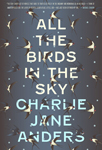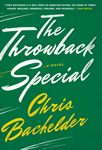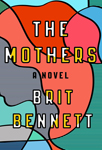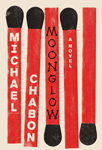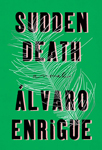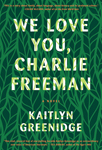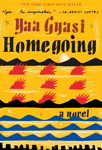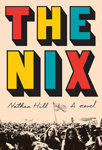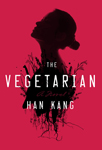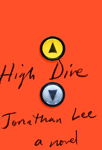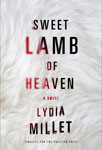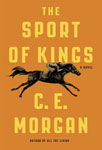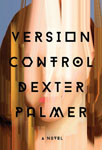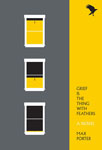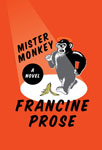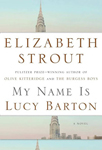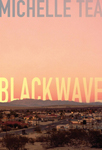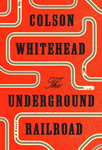by Charlie Jane Anders
Buy it at Powell’s »Susannah Cahalan: I had too much fun reading—OK, maybe “fun” isn’t the perfect word to describe novels about abortion and terrorism, but how else to explain the pure joy in reading, or rather the wish to distill both books down to their essences and inject them into your bloodstream so that you too could write like these two? This may stem from the past year spent reading exclusively nonfiction, mainly about psychosis and schizophrenia, so forgive my unrestrained enthusiasm. Here it goes.
I had heard rumblings about The Mothers. I skimmed a glowing profile in the New York Times about the debut author Brit Bennett, and my cousin pointed to the book when I was reading it and said, “That book has some buzz.” So The Mothers did benefit from a small amount of pre-reading hype. A Greek chorus of gossipy church ladies (“the mothers”) open the book, setting the narrative up as “an unripe secret, plucked too soon, stolen and passed around before its season.” That secret is layered, but centers on the shifting relationships and narrative perspectives within a love triangle made up of Nadia Turner, her best friend Audrey, and Luke Sheppard, the pastor’s son.
Nadia is mourning the loss of her mother, who shot herself in the head six months before. She is “young and scared and trying to hide her scared in her prettiness,” Bennett writes. One place she hides is in the arms of the older boy Luke, who is just as scared and lost, but for different reasons. When she becomes pregnant and decides to get an abortion, the two fall apart. In the aftermath of being “unpregnant,” she grows close to another lost soul, a deeply religious girl named Audrey, who has also lost her mother (to indifference, not death). But when Nadia leaves for college, Audrey meets Luke—while that “unripe secret” continues to haunt these three narrators over the next decade.
In a less-gifted writer’s hands the plot could easily curdle into a Lifetime movie. With the exception of a few melodramatic moments (I felt that Audrey was a little too perfect at times), the book never becomes manipulative, but works as a vehicle for Bennett’s meditations on motherhood, love, community, and loss. I enjoyed, for example, the church elder mothers as a framing device—speeding up and slowing down time—and I felt it allowed Bennett’s poetic voice to really shine. One example from the mothers that I quadruple underlined:
We were girls once. It’s exciting, loving someone who can never love you back. Freeing, in its own way. No shame in loving an ain’t-shit man, long as you get it out your system good and early. A tragic woman hooks into an ain’t-shit man, or worse, lets him hook into her. He will drag her until he tires. He will climb atop her shoulders and her body will sag from the weight of loving him.
I really didn’t want to like High Dive because I fell so in love with The Mothers, but then came the opening involving the threat of shooting dogs. Unlike The Mothers, the suspense of High Dive reads like a genre thriller. This is partially because the main story is plucked from the headlines—a reimagining of the IRA bombing of Brighton’s Grand Hotel in 1984. The IRA intended for the blast to kill Margaret Thatcher, who was staying at the hotel, but left unharmed. Instead the terrorist attack killed five and wounded dozens. Jonathan Lee explains that he wrote this book to “imagine myself into those gaps”—gaps that revolve around rumors about an IRA accomplice who was never caught.
A 24-year-old IRA terrorist named Dan shares the narrative with the Grand Hotel, as the staff frantically preps for the prime minister’s arrival. Moose Finch, the hotel’s assistant general manager, is a former near-pro diver (hence, the title) who dreams of a happy Thatcher and a promotion. His teenage daughter Freya—easily my favorite character—works at the hotel part-time as she tries to figure out her next move into adulthood. She’s droll, but still naive, and the scenes of her flirtations with Dan (she doesn’t know that he wants to blow up her hotel) are fabulous. Lee has a knack for description. My favorite? “He looked like the love child of badgers.” How great is this line?
The narrative is at its best right here inside the Grand Hotel. Lee peppers the story with details that make this world pop, describing the “specific art to every task,” from the “bed-skirt check” to the “pillow karate chop.” Moose sums up the relationship between guests and the service industry:
In the main, people were kind if you were kind. They wanted to have a good time. You gave them the best and worst of yourself. The huge lie that you would escalate their complaint to Head Office. Telling the truth, almost always, when you wished them a very good stay.
Perhaps because this world works so well, Dan never felt fully fleshed out to me. Though he was arguably the most important character to the overall narrative, I found myself wanting to skip past his sections and return to the Grand Hotel when it was his turn on the page.
Knowing what is in store for everyone makes for some nerve-racking reading that never feels cheap. By the last few chapters, I white-knuckled my way through, nearly closing the book to avoid the inevitable boom. These scenes are so cinematic they are crying out for an adaptation—Martin Scorsese, consider this a heads-up.
I had a harder time getting through High Dive, even with the literal tick-tock threat of a terrorist attack. It just didn’t carve me up the way that The Mothers did. Yes, it is a smaller story. The stakes are not nearly as high. There are no bombs, no terrorists, no threat of serious bodily harm, but that lean love story packs quite a wallop. Even the final moment of High Dive in the aftermath of the explosion, as we take stock of the dying and wounded, didn’t compare to the drama of the final sentence in The Mothers, a paragraph that even my body—spine tingling, hair standing on end—responded to: “We see the span of her life unspooling in colorful threads and we chase it, wrapping it around our hands as more tumbles out. She’s her mother’s age now. Double her age. Our age. You’re our mother. We’re climbing inside of you.”
Match Commentary
By Kevin Guilfoile & John Warner
John Warner: First My Name Is Lucy Barton, and now High Dive, my personal favorites are going down early. If Mister Monkey bites it, I may go on strike for the rest of the tournament.
No, I wouldn’t, especially as The Mothers is a very worthy book that I’ve recommended widely since reading it. The way Brit Bennett entangles her characters, and her insistence on simultaneously loving them while given them no easy way out of their situations, wrapped me up good and tight in her narrative.
I always felt like Bennett was rooting for her own creations, but at the same time, couldn’t let them off the hook. Judge Cahalan’s astute observation that The Mothers could’ve descended into melodrama but doesn’t is spot on. It makes for a very honest read, a true read. As I said, I recommend it.
Still, I just felt High Dive was really masterful, with some elements of a tick-tock thriller, yes, but set against a political backdrop of significant import and larded with compelling characters. It would make a fantastic prestige limited series.
Kevin Guilfoile: This is a year in which almost everything I read feels urgent and topical. I suppose this is simply because the act of reading fiction is inherently an act of empathy, and if you had to define the awfulness of the current administration at its most basic level, you could describe it as a nearly complete failure of empathy. I won’t reduce The Mothers to an “issue novel”—it’s far more than that—but as I picked it up again to remind myself of its contours, I had, fresh in my head, the voice of a newly empowered Oklahoma state lawmaker who claims that pregnant women are merely “hosts” for the fetuses inside them. This was a prelude to a law he introduced that basically required a woman to get a man’s permission before she had an abortion.
There is a moment late in The Mothers in which a woman accompanies a friend to see a doctor, who asks the patient if she had ever had an abortion. Afterwards the friends have this exchange:
“I can’t believe she asked you that,” Nadia said.
“Asked me what?”
“You know. The abortion thing. Why does it even matter?”
“I don’t know. It must, if she asked about it.”
“Still. I can’t believe it follows you around like that.”
This exchange is more about the dynamic between the characters (which I won’t reveal here) than it is about the abortion issue, but reading that passage again, I thought about how simple and real and personal it felt, and I also thought about the great superpower of fiction: to bring us not just knowledge, but understanding.
Do you think Donald Trump has ever read even one novel to the end, John? Even in school? I think there is almost zero chance that he has. (Steve Bannon, on the other hand, strikes me as a guy who has read lots of novels and has misunderstood them all.)
John: No, Donald Trump has almost certainly never read a novel to completion. Even his briefings are CliffsNotes. Maybe the problem is that they give him the same CliffsNotes on every issue:
Protagonist: Donald J. Trump
Antagonist: Media (dishonest)
Conflict: Man who desires to make America great is not appreciated for the greatness with which he is making America.
Plot: Great man who won tremendous electoral victory, really tremendous, does fabulous things fabulously.
Symbols: Red hat = power, Red tie = power, Red face on chief advisor = drunk on the job
How many commentaries have we gone without thinking about Trump? One? We need this asshole out of office so my mind can return to its regularly scheduled programming of House re-runs. House is the cuddly kind of asshole Americans can love.
Kevin: This part will be Trump-free, I promise.
High Dive was one of my favorite novels in a terrific year of reading. It was brilliantly pieced together. As you point out, it has the basic structure of a thriller, but two of the three main characters are not important cogs in the terror storyline. They are entirely incidental. Even Dan, our IRA man, doesn’t do much terrorizing on the page. In fact, if you want to know what he’s actually doing at the hotel, you pretty much have to go look up the real-life bombing on Wikipedia.
This would have been a very good novel even if it did not climax with a dramatic assassination attempt on Margaret Thatcher. If this had just been a novel about Moose and Freya and Freya’s flirtations with a handsome Irish hotel guest, I would have gobbled it up. But Lee layers his terrorist plot, like a piece of colored acetate, on top of this lovely story, and as a result the tension in every scene winds around and around until it inevitably snaps. It’s ingeniously conceived. I don’t know what the chances are that High Dive will make it back as a Zombie, but I want to raise a clarion ruckus in its favor.
John: I note also that “fun” makes its way into the commentary again, Cahalan using the word to connote the “joy” of reading these two excellent books. Reading is, or at least, should be “fun,” even when reading about heavy topics like these. In these particularly trying times you see some talk about how books/art/whatever are “more important than ever,” which may be true, but sometimes I do not like this word “important.”
Or maybe it’s that I need to change my frame of reference and embrace the notion that “fun” and “important” are indeed compatible. Burrowing into the hopes and dreams and disappointments of people, as we experience in both of these books, has always been important, but it wouldn’t happen so often if it wasn’t also fun.
Kevin: Every year of the ToB seems to develop at least one theme, and you may have hit on the first for this year. A number of these books contain dark and important themes, and yet they succeed entirely as enjoyable reads. Fun even. That’s a good trick for an author if you have it in your bag.
John: It’s a special day tomorrow, when previous ToB competitor and self-admitted superfan Will Chancellor dons the judge’s robes to decide between Michael Chabon’s Moonglow and Max Porter’s Grief Is the Thing With Feathers, while Portia Turner and Kyle Curry of Chicago’s treasured The Book Cellar step into the octagon, I mean, commentating booth.



